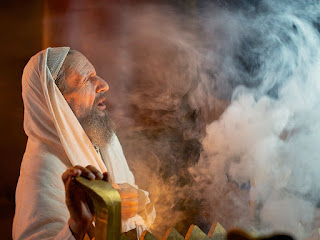Two days before Christmas, today, we hear in our Gospel, Zechariah breaking his silence at the birth of his son, John. “Immediately his mouth was opened, his tongue freed, and he spoke blessing God.”
The Christian life oscillates between silence and acclamation. On one hand, Christians do not dread silence, we welcome it. Our Lord himself had many moments of quiet prayerful solitude in which he conversed with his Heavenly Father. God is met in silence. Each day, we need periods of silent prayer. Psalm 46 commands, “be still, and know that I am God.” Our culture doesn’t understand silence, and consequently misunderstands the meaning of Christmas.
But we know, that we must quiet down our lives in order to make room for Christ.
On the other hand, Christmas marks an end of the silent night of Advent, leading the Church to jubilant and joyful acclamation that a Savior is born for us, Christ the Lord. Like God loosening the tongue of Zechariah, Christmas loosens our tongues to sing carols and joyful songs and to proclaim that Christ is born.
With the hours of Advent we have left, we do well to enter into the silence, to quiet ourselves, in order to prepare a place in our heart to celebrate with new enthusiasm and joy, the birth of Christ the Savior. Be generous with the silent time you give to God, you will not regret it.
In our noisy and frantic world, cultivating silence may feel unnatural, putting down the technology and noise that is so omnipresent these days. Yet, turning this stuff off and entering into quiet, allows us to perceive God’s gentle whisper which we long to hear. Consider carving out a time each day to sit quietly, even if only for a few minutes, focusing solely on the presence of our Creator. Silence is not a void, but a sacred room of encounter. It grants us the clarity to hear God’s guidance, the peace to surrender our troubles, and the courage to live more authentically our Christian calling. As we move from waiting to rejoicing, let holy silence shape our hearts, opening us to the true gift of Emmanuel—God with us—for the glory of God and the salvation of souls.
- - - -
Let us bring our prayers before the Lord who hears us in every stillness and in every song.
For the Church: That the People of God may find moments of holy silence in prayer and contemplation, preparing our hearts for the proclamation of the Good News.
For leaders of government: may they work to protect and promote the common good, especially for the marginalized and vulnerable, with humility and reverence for the dignity of every human life.
For families and communities burdened by secular noise, stress, materialism or conflict.
For those struggling to believe in God’s presence or who feel distant from Him:
That, like Zechariah, they may experience God’s power breaking into their lives and freeing them to speak and live the truth of the Gospel.
For the sick, the lonely, and the grieving: That in contemplation of Christ’s coming, they may find comfort and the strength to trust in God’s loving plan and to receive the healing only God can give.
For all who have died, for our deceased family members, friends, fellow parishioners and benefactors, that they may rejoice forever in the heavenly kingdom, especially…
Heavenly Father, You speak to us in the quiet of our hearts and invite us to echo Your goodness with words of praise. Hear the prayers we have voiced today. Guide us from the silence of Advent into the joyful song of Christmas. We ask this through Christ our Lord. Amen.






